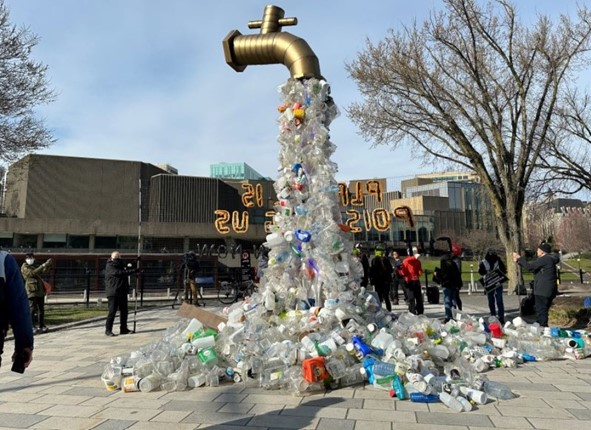
US Takes a Stand Against Plastic Producers, Raising Hopes for a Robust Global Treaty
The United States' recent shift in stance has sparked accusations of betrayal from the plastics industry while environmental advocates and a negotiator from the Pacific region have welcomed the move.
After years of hesitancy, the US government has informed activists that it will advocate for a new international treaty aimed at curbing plastic waste by focusing on reducing plastic production rather than solely promoting measures like recycling.
According to notes from a source present at the briefing, the US government acknowledged yesterday that while demand-side strategies to cut plastic production, consumption, and waste are part of the solution, Washington sees supply-side measures as essential tools in this effort.
Three other sources present at the briefing also confirmed to Climate Home that the US government has changed its position, as initially reported by Reuters.
Previously, the US had aligned with Saudi Arabia, advocating for the new treaty to prioritize recycling while leaving decisions on production limits to individual nations.
The US is the only G7 country that has not joined the self-described "high ambition coalition against plastic pollution."
This policy shift was met with praise from environmental activists but drew sharp criticism from the American Chemistry Council (ACC), the main trade association for the plastics industry.
Industry Backlash
ACC President Chris Jahn accused the White House of succumbing to the demands of "extreme NGO groups" and betraying US manufacturing interests. He also cautioned that the Senate may block the US from joining a plastics treaty if it reflects this new stance.
Environmental groups, however, responded positively. Tim Grabiel, a lawyer with the Environmental Investigation Agency, noted that this marks a significant change in the US's position, which could help salvage the challenging negotiations. He urged the US to commit to reducing virgin plastic production by 40% by 2040—a target proposed by Rwanda and Peru during negotiations in April.
Dennis Clare, a plastics negotiator for Micronesia, told Climate Home that the new US position represents a "major development" that could lead to a more ambitious treaty.
Years in the Making
The push for a global plastics treaty began at the United Nations Environment Assembly in Nairobi in 2022, where governments agreed to create a treaty to promote sustainable plastic production and consumption.
Since then, four rounds of negotiations have taken place, with the fifth and final round scheduled in Busan, South Korea, from November 25 to December 1. Any agreement reached in Busan would be finalized at a diplomatic conference a few months later.
Ahead of these talks, the European Union has warned that "delaying tactics" by certain countries could make it "very difficult" to reach an agreement in Busan.
The European Commission has pointed to "major oil-producing countries" as being responsible for slowing negotiations, while a Latin American negotiator told Climate Home in June that the Like-Minded Group, including Russia and Saudi Arabia, has been employing these delaying tactics.
Production vs. Pollution
A key point of contention is whether the treaty should focus solely on halting plastic pollution or also include targets to reduce the increasing production of plastics, which is at the root of the problem. Beyond environmental pollution, plastic production also contributes to greenhouse gas emissions, as it relies heavily on fossil fuels.
Countries like Russia, Saudi Arabia, and India have resisted efforts to set production limits, preferring to focus on recycling and preventing plastic waste from entering the oceans. The US and Iran have also sought to dilute the treaty's ambitions.
In contrast, a coalition of countries has launched an initiative called "Bridge to Busan," aiming to secure an agreement with targets to reduce plastic production. Plastics are derived from oil and gas, and their production is a significant and growing source of greenhouse gas emissions.
Micronesia is among the nations leading the "Bridge to Busan" coalition. Their negotiator, Dennis Clare, expressed hope on Thursday that the US will now join this initiative and take a leadership role in addressing plastic production, which he described as the cornerstone of any effective treaty on plastic pollution. The US has not yet indicated whether it will support this initiative.
There are also ongoing disagreements about how detailed the treaty should be, its legal binding nature, and the structure of financial mechanisms to support government efforts to combat plastic pollution, according to a June summary from the EU.
While some countries advocate for a new dedicated fund, others, including Gulf nations, prefer to use an existing institution like the Global Environment Facility to channel funding. Additionally, Ghana has proposed a global fee on plastic production.